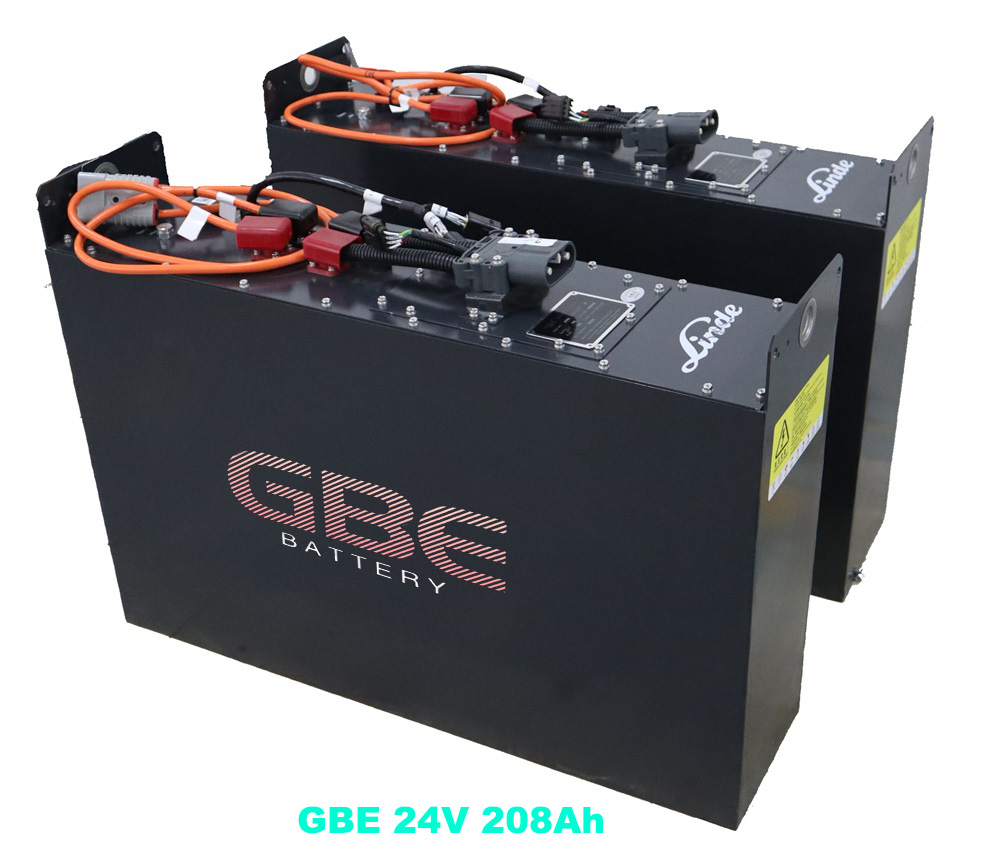About GBE Forklift Battery

In the modern warehousing and logistics industry, forklifts are widely used in factories, warehouses, distribution centers and other places as important material handling tools. Although traditional lead-acid batteries were once the mainstream power source for forklifts, with the advancement of technology, lithium batteries have gradually become the best choice for forklift batteries due to their many unique advantages. This article will explore several key advantages of GBE battery forklift lithium batteries to help customers understand why choosing lithium batteries can improve the efficiency of forklifts and reduce operating costs.
1. Higher energy density and endurance
Energy density: Lithium batteries have higher energy density than traditional lead-acid batteries, which means that lithium batteries can provide longer endurance at the same volume and weight. Long-term efficient operation of forklifts can reduce charging frequency and improve operating efficiency.
Longer working time: Lithium batteries can ensure that forklifts operate efficiently throughout a shift without frequent stops for charging, especially suitable for long-term, high-load operating environments.
2. Shorter charging time
Fast charging: Lithium batteries charge faster than lead-acid batteries, usually only 1-2 hours to fully charge, greatly improving the efficiency of forklifts. Lead-acid batteries usually require a longer charging time, which may affect the workflow.
No need to fully discharge: Lithium batteries do not need to be fully discharged when charging, and can be charged at any time without damaging the battery life, which is crucial to improving the continuous operation capacity of forklifts.
3. Longer service life
Longer service life: The service life of lithium batteries is usually 2-3 times longer than that of lead-acid batteries, which can effectively reduce the cost and frequency of battery replacement. Generally, the life cycle of lithium batteries can reach 5-7 years, or even longer.
Low maintenance cost: Lithium batteries do not require regular maintenance and watering operations like lead-acid batteries, which reduces the cost and time of maintenance and management.
4. Stronger safety
Built-in protection mechanism: Lithium batteries are usually equipped with BMS (battery management system), which can monitor the status of the battery in real time, prevent overcharging, over-discharging, short circuit and other problems, and ensure safe use. In contrast, lead-acid batteries may have the risk of leakage or explosion in some cases.
Resistance to extreme temperatures: Lithium batteries perform better than lead-acid batteries in high and low temperature environments, and can work stably in a wider temperature range, especially suitable for working environments in extreme climates.
5. More environmentally friendly and sustainable development
No harmful substances: Lithium batteries do not contain harmful substances such as lead and cadmium, and are more environmentally friendly than traditional lead-acid batteries. As environmental regulations become increasingly stringent, forklifts using lithium batteries can help companies meet environmental protection requirements.
Recycling and reuse: The recycling rate of lithium batteries is high, which can reduce the generation of waste and promote sustainable development.
6. Reduce operating costs
Lower total cost of ownership (TCO): Although the initial purchase cost of lithium batteries is relatively high, their long service life, low maintenance costs and low power consumption make the total cost of ownership of lithium batteries much lower than that of traditional lead-acid batteries.
Reduced downtime: Fast charging and long battery life mean that forklifts can be down less, improving the overall productivity of warehouses or logistics centers.
7. Intelligent management and monitoring
Remote monitoring system: Many forklift lithium batteries are equipped with intelligent battery management systems (BMS), which can monitor the battery's charge status, temperature, health status and other information in real time, helping operators to accurately grasp the battery status and perform necessary maintenance.
Data analysis: Through big data analysis, enterprises can understand the battery usage, performance and fault warning, so as to optimize asset management and extend battery life.
8. Better adaptability and compatibility
Wide compatibility: Lithium batteries are compatible with a variety of different brands and models of forklifts, allowing enterprises to choose flexibly and reducing constraints when purchasing equipment.
Customized service: According to the different needs of customers, lithium batteries can provide customized battery capacity, size and other solutions to meet the requirements of different working environments.
Conclusion:
As the forklift industry develops towards a more efficient, environmentally friendly and intelligent direction, lithium batteries, as a new generation of power solutions, have gradually become the future trend of the forklift industry. Choosing a lithium battery product with high energy density, fast charging, long life, safety and environmental protection can not only improve the operating efficiency of the forklift, but also greatly reduce the operating costs of the enterprise. For those companies seeking long-term sustainable development, forklift lithium batteries are undoubtedly the best choice.



